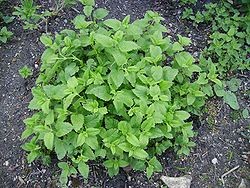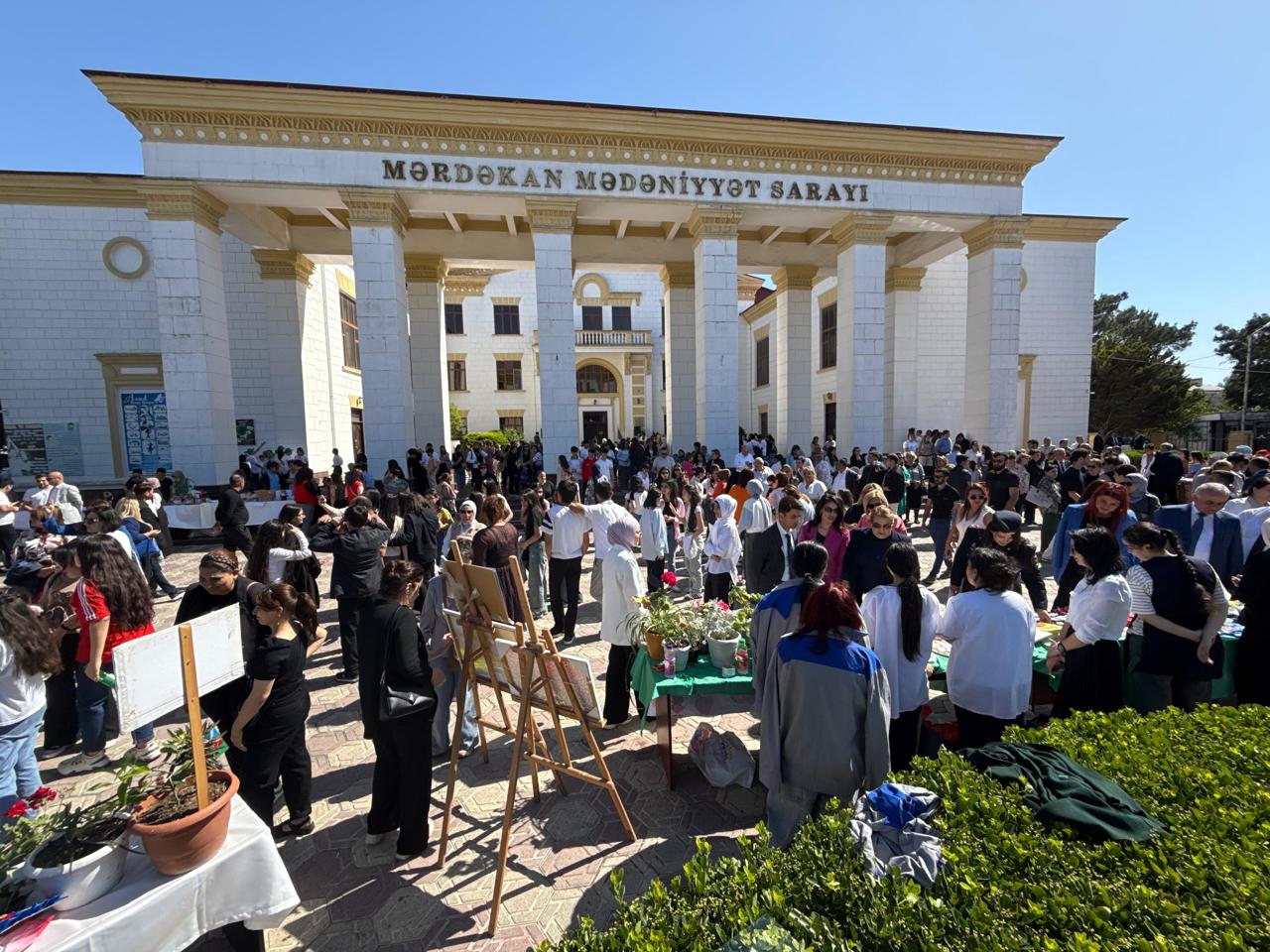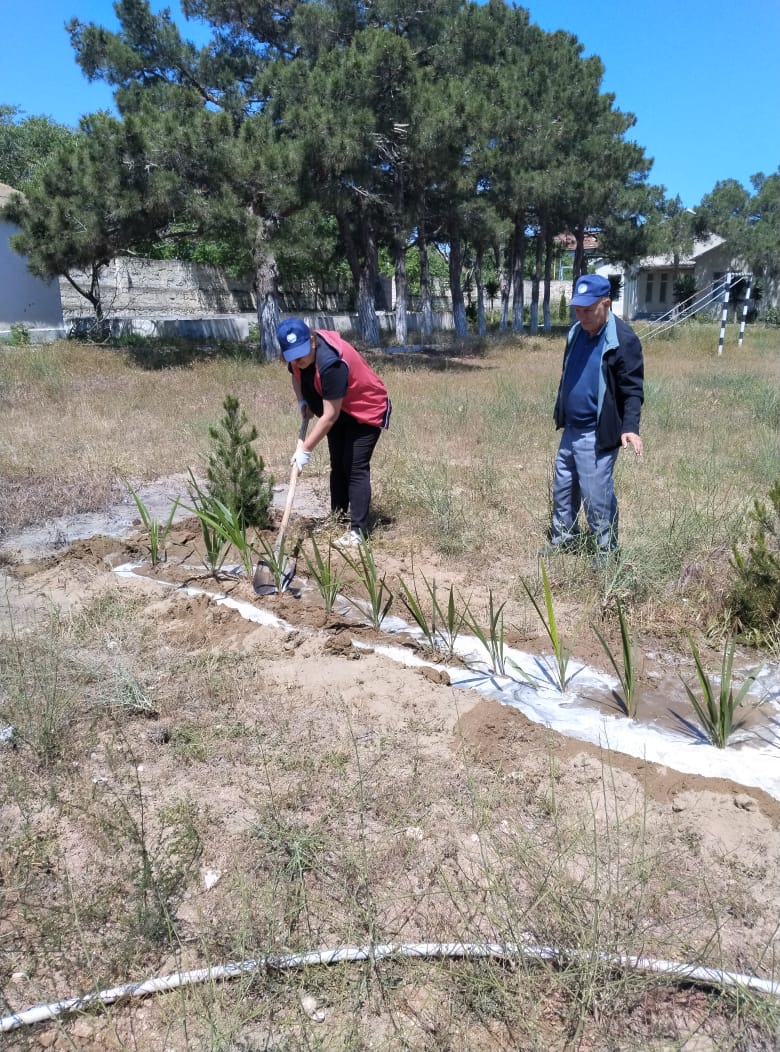Melissa officinalis L. (Ballynana) species is introduced in the area of Dendrology Garden
Melissa officinalis L. (Ballynana) is a perennial herb belonging to the Melissa L. genus of the Dalmazkimilar (Lamiaceae Martinov.) family. Medicinal gourd is naturally distributed in the Mediterranean Sea, the countries of Asia Minor, and the Caucasus. In Azerbaijan, the medicinal gorse is wide spread in the Greater Caucasus, Lesser Caucasus, Kur-Araz and Lankaran plains, in the mountainous part of Nakhchivan. According to the species, it is found in forest. It was used by the Greeks and Romans 2000 years ago. Churchmen made arousing drinks from badranj (stimulants). Melissa has been used as an incense by people since ancient times. They believed that the lemon scent of the smoke keeps people away from devil and the evil eye.
Medicinal gourd is a perennial herb with rhizomes, 30-120 cm tall. It has a fringed root system. Additional lateral roots are developed. The stem is 0.4 cm in diameter, four-lobed, flat, green, slightly hairy and branched. Branches join the stem at an acute angle. The leaves are opposite, stalked, ovate, 4.2 cm long and 2.8 cm wide, the edges are serrate, slightly hairy, the underside is slightly lighter than the upper side, the upper leaves are larger than the lower leaves, and the surface is slightly wrinkled. The veins on the leaves are easily visible. Its white flowers are small, semi-cube-shaped, and develop in leaf axils. It is cross pollinated. The flower group is 20-40 cm long with a spiral branching shape. The seeds are ovoid, brown, 2 mm long and 1 mm in diameter. The fruit is light brown and gray, consisting of four small cones. The white flowers attract bees, so the genus Melissa means "honey bee" in Greek. According to its external appearance, it resembles a badranj. Popularly known as honeysuckle, badranj or lemongrass.
Growth begins in the first ten days of April. It buds at the end of June, flowers in July and bears fruit in September. Honeysuckle is a luminous plant. When growing in the shade, the amount of essential oils in its leaves decreases and the plant becomes less fragrant. Heat demanding. A temperature of 10-12°C is necessary for the germination of its seeds. The optimal temperature for its development is considered to be 20-25°C. Honeysuckle is not very demanding on the soil. It grows well in fertile, weakly acidic soils with a light structure and acidity close to neutral. It is considered a cold-resistant plant, frost can destroy it. In winter, the upper part of the plant is destroyed, in spring it grows again.
On July 24, 2023, Melissa officinalis L., which was brought from the territory of the Gala settlement of the Khazar region, located in the northeastern part of the Absheron peninsula, was introduced to the territory of the Dendrology Garden. The main purpose of the work is to study the morphological, physiological, vegetative, generative reproduction characteristics of honeysuckle, to investigate the development perspective in the garden area, to obtain essential oil and phytochemical research. Vegetative propagation method was used as primary research objective. The species is planted in an area with full sunlight and little shade. While preparing the land for planting, agrotechnical maintenance was carried out, and field studies were regularly conducted on various parameters.
The species selected as a research object is widely used in practical, experimental, folk medicine, as well as in pharmacology and veterinary medicine. It contains citral, citronellol, heraniol, nerol, linalool, heranylacetate, myrcene and terpenoid substances. In addition, it is rich in flavonoids, fatty oils, vitamins C, B1, B2, carotene, coumarins, antioxidants and aromatic compounds. The main component of the essential oil in its composition consists of citral and citronellal substances, which have a lemon smell. It contains phenolic compounds, flavonoids with antioxidant activity - apigenin, cosmosin, luteolin, synaroside, rhamnocitrin, phenol - carboxylic acids - hentizine, salicylic, para-hydroxybenzoic, vanillin, protocatechinic acid. Vitamins B1, B2 (Riboflavin), C, β-carotene, macroelements, potassium, calcium, magnesium, iron, and microelements include manganese, copper, zinc, molybdenum, chromium, selenium, nickel, and vanadium.
This plant has antioxidant, antibacterial, antifungal, antiviral, sedative, hypotensive, choleretic, hemostatic, vasoconstrictor, analgesic, laxative and anti-inflammatory effects. It is the main component of the composition of sedative drugs. It affects shortness of breath, heart pain, tones and strengthens the nervous system. Its high therapeutic effect is due to its essential oil. Badranj plant regulates the secretion of gastric juice, reduces spasm, eliminates enzyme deficiencies and improves metabolism. It is used in neurosis, lethargy, vegetative-vascular dystonia, intestinal dysentery and intestinal spasms, cholecystitis, cholangitis, kidney stones, urinary tract diseases, angina pectoris and climacteric syndromes. When applied externally, it has a good effect on the skin with antibacterial, antiviral, frunculosis, herpes, stomatitis and periodontosis. Melissa tea is also used to treat herpes. Due to its antioxidant content, creams with honeysuckle extract are effective in the treatment of herpes, help to heal quickly, and reduce the speed of the disease. Hot teas made from badranj relieve headaches and dizziness. The combined extract and infusion of the watermelon plant has a sedative, spasmolytic, pain-relieving, hypotensive effect. Melissa infusion is a tea that lowers blood pressure. Although useful for people with high blood pressure, consuming more than 2 glasses per day can cause faintness and fatigue. Drinking too much Melissa tea can cause headache, dizziness, nausea, vomiting, abdominal pain, and in rare cases, an increase in body temperature.
It is used in perfumery due to its lemon-smelling essential oil. Fresh chopped leaves are used in the preparation of soups, vegetable dishes, salads, and dried leaves are used as a spice. It has a slightly astringent taste.




